Losing a limb is a life-changing event. It affects not just the body but also the mind. Many people feel anxious, sad, or even hopeless after an amputation. This is completely normal. Your body has changed, and adjusting to this new reality takes time.
But here’s the good news—you are not alone. Many people have gone through this journey and found ways to rebuild their lives. With the right support, tools, and mindset, you can regain confidence, find happiness, and live fully again.
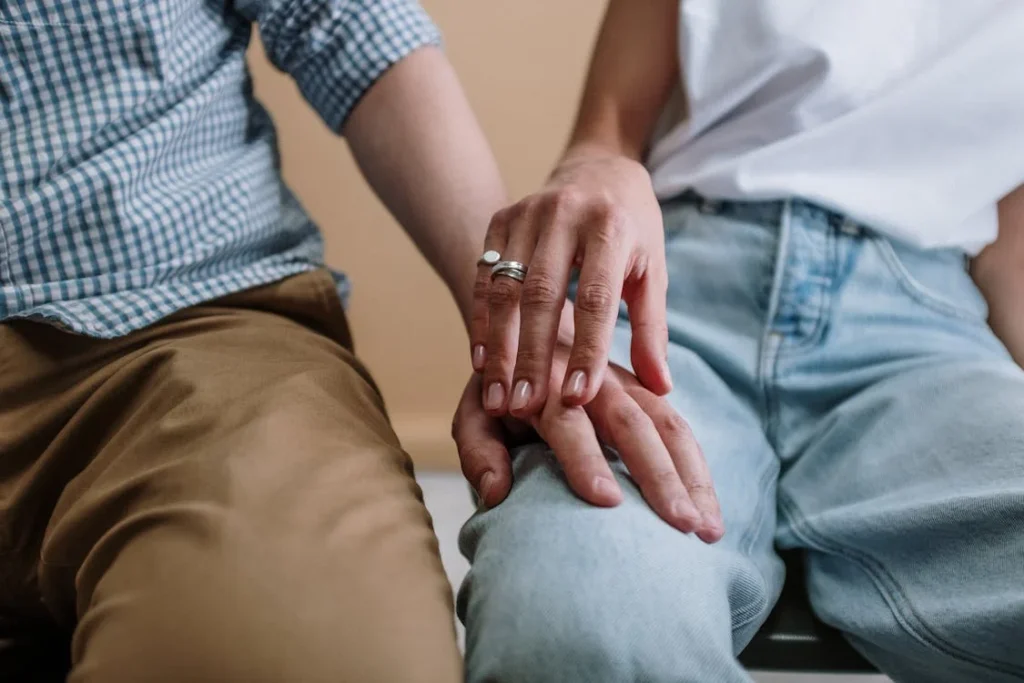
Understanding the Emotional Impact of Amputation
Amputation is more than just the loss of a limb—it’s a major change that can affect every part of life. Many people struggle with feelings of grief, fear, and uncertainty. It’s normal to feel this way. Your brain and body are adjusting to something new, and that can be overwhelming.
Why Anxiety and Depression Happen After Amputation
When something unexpected happens, the mind often reacts with fear. After losing a limb, you might worry about how to do simple tasks, whether people will treat you differently, or if you’ll ever feel like yourself again. These thoughts can lead to anxiety.
Depression, on the other hand, often comes from a deep sense of loss. You may miss the way things used to be, feel frustrated about your limitations, or struggle with self-esteem. The brain sometimes gets stuck in negative thoughts, making it hard to find motivation or hope.
Physical pain can also play a role. Phantom limb pain, discomfort from healing, or difficulty adjusting to a prosthetic can make daily life harder, increasing feelings of sadness and stress. Lack of sleep, changes in routine, and a loss of independence can make emotions even stronger.
The Power of Acceptance and Patience
One of the first steps to healing emotionally is accepting that it’s okay to feel this way. There is no right or wrong way to process this change.
Some people recover emotionally faster, while others take longer. What matters is understanding that healing is a process, and every step forward—no matter how small—is progress.
Patience is key. It’s easy to feel frustrated when things don’t improve quickly. You may expect to adjust faster, but emotions don’t follow a strict timeline. It’s important to be kind to yourself and acknowledge even the smallest victories.
How Support Can Make a Difference
You don’t have to go through this alone. Family, friends, and support groups can provide comfort and encouragement. Talking about your feelings with someone who understands can make a huge difference.
Many people find strength in sharing their experiences with others who have gone through similar challenges.
Professional help is also important. Therapists who specialize in trauma or disability can help you work through fears and negative thoughts. They can teach techniques to manage anxiety and depression, helping you regain confidence in yourself.
At Robobionics, we understand that emotional healing is just as important as physical recovery. That’s why we provide not only high-quality prosthetics but also guidance on how to adjust to life after an amputation.
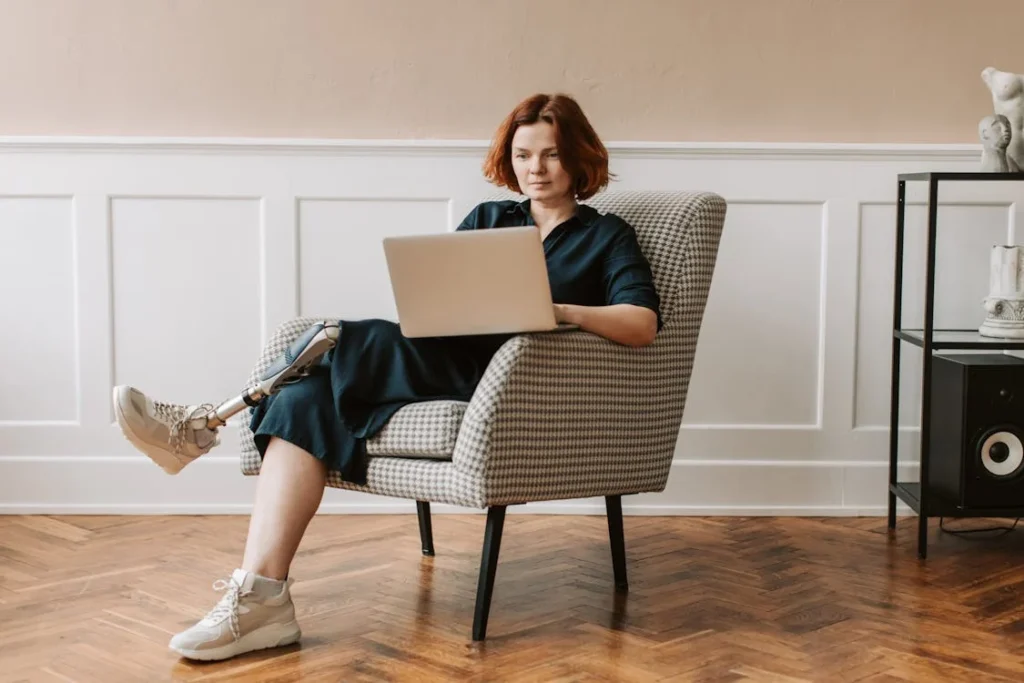
Rebuilding Confidence and Finding Purpose
After an amputation, it’s easy to feel like life has changed in a way that you can’t control. You may worry about how you look, how others see you, or whether you’ll be able to do the things you once loved.
These thoughts can create self-doubt and make it hard to move forward. But confidence is something you can rebuild, step by step.
Taking Small Steps Toward Independence
Regaining independence is one of the best ways to boost confidence. Even the smallest achievements can help you feel stronger.
Learning how to do daily activities with your prosthetic, adapting to new routines, and setting small goals can make a big difference. The more you push yourself to try new things, the more capable you will feel.
It’s important to remind yourself that progress takes time. At first, things might feel difficult or frustrating. But just like learning any new skill, adapting to life after amputation requires practice.
Every small step is a victory, whether it’s tying your shoes, making a meal, or simply getting through the day with a positive mindset.
Changing the Way You See Yourself
After an amputation, many people struggle with body image. It’s normal to feel different, and sometimes that difference can feel like a loss of identity.
But your worth is not defined by your physical appearance. What truly matters is who you are as a person—your kindness, your strength, and your ability to keep moving forward.
Surrounding yourself with supportive people can help shift your mindset. Friends and family who treat you with love and respect can remind you that you are still the same person inside.
Engaging with communities of other amputees can also be incredibly empowering. Seeing others who have faced similar challenges and overcome them can inspire you to do the same.
At Robobionics, we believe that a prosthetic should not just restore function but also enhance confidence. That’s why we design prosthetics that are comfortable, easy to use, and fit seamlessly into your daily life.
Our Grippy™ bionic hand, for example, provides a natural, intuitive way to regain movement, making the transition smoother and less stressful. If you’re curious about how a prosthetic can help you regain confidence, book a free demo with us today.
Finding New Ways to Enjoy Life
One of the most powerful ways to overcome anxiety and depression is to focus on what brings you joy.
You may not be able to do things exactly the way you used to, but that doesn’t mean you have to stop doing what you love. Many people find new hobbies or adapt old ones to fit their new reality.
If you loved sports, there are adaptive options available. If you enjoyed music, painting, or writing, those are things you can still embrace. Some people even discover passions they never knew they had, such as mentoring others or getting involved in disability advocacy.
Finding purpose again can give life new meaning. It’s about focusing on what you can do instead of what you’ve lost. With the right mindset and support, you can create a life that is fulfilling and meaningful.
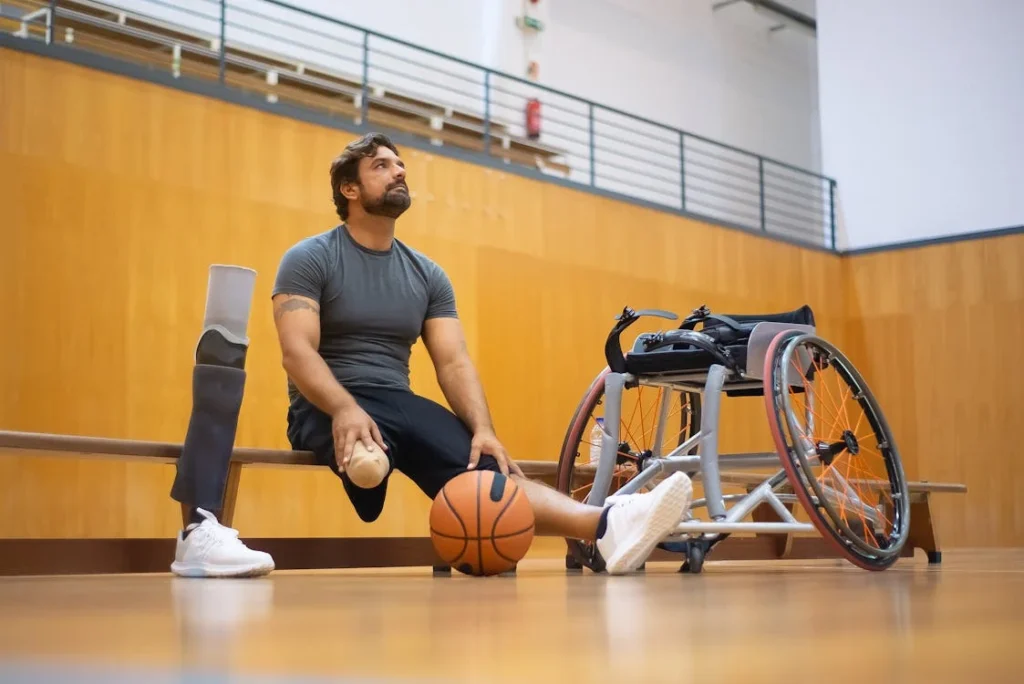
Managing Anxiety and Overcoming Negative Thoughts
Anxiety after an amputation can feel overwhelming. You may constantly worry about the future, feel nervous in social situations, or fear that you won’t be able to do things on your own.
These thoughts can make it difficult to focus on healing and adjusting. But anxiety doesn’t have to control your life. There are ways to manage it and regain a sense of calm.
Understanding the Source of Anxiety
Anxiety often comes from fear—fear of change, fear of being judged, or fear of failure. After an amputation, your mind may focus on all the things that feel uncertain.
You may wonder how people will react to you, how you’ll handle daily tasks, or whether you’ll ever feel “normal” again. These fears are understandable, but they don’t define your future.
Recognizing your fears is the first step in overcoming them. When you catch yourself thinking negatively, ask yourself: Is this thought really true?
Many times, anxious thoughts exaggerate the worst-case scenario. Instead of believing them, challenge them. Focus on what you can do and remind yourself that you are capable of adapting.
Practicing Mindfulness and Relaxation Techniques
One of the best ways to calm anxiety is to stay present in the moment. When your mind starts racing with worries, take a deep breath and focus on what is happening right now. Mindfulness exercises, such as meditation or deep breathing, can help you stay grounded.
Simple techniques like closing your eyes, breathing in deeply, and slowly exhaling can instantly reduce stress. Guided meditation apps or calming music can also help create a sense of peace.
Practicing these techniques regularly can train your mind to respond to anxiety in a healthier way.
Facing Social Anxiety After an Amputation
Being in public after an amputation can feel intimidating. You might worry about how people will look at you or what they might say. These thoughts can make social situations stressful, leading to avoidance. But isolating yourself can increase feelings of depression and loneliness.
It’s important to remind yourself that people’s reactions are beyond your control. Some may be curious, others may not even notice, and many will treat you just the same.
The way you carry yourself can influence how others perceive you. If you walk with confidence, people will see you, not just your prosthetic.
Starting small can help. Begin by going to familiar places where you feel comfortable. Engage with people you trust before branching out to new environments. Over time, social interactions will feel more natural, and your confidence will grow.
If you’re struggling with social anxiety, talking to a therapist can help. A professional can provide coping strategies that make interactions easier. Remember, you deserve to be seen and heard, and the world is still yours to explore.
At Robobionics, we understand the emotional challenges that come with using a prosthetic. That’s why we offer personalized support to help users adjust comfortably. If you’re looking for guidance on how to transition smoothly, contact us today.
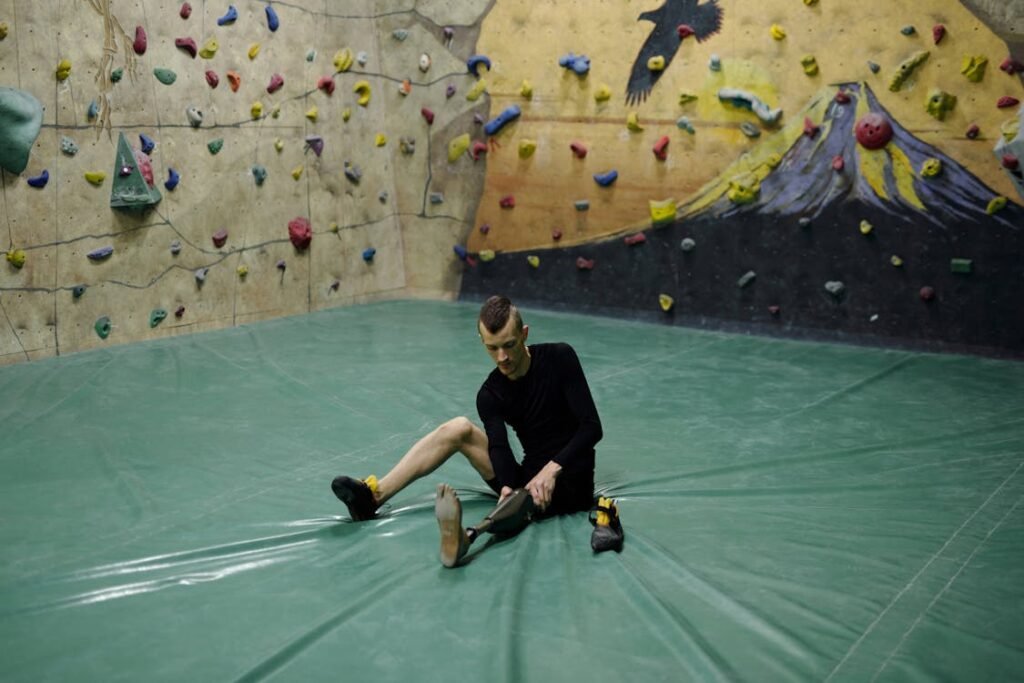
Coping with Depression and Finding Hope Again
Depression after an amputation is common, but that doesn’t mean you have to live with it forever. Feelings of sadness, loss, and frustration can take over, making it hard to find joy in everyday life.
But no matter how deep the sadness feels, there is always a path forward. Healing takes time, but with the right steps, you can rebuild happiness and regain a sense of purpose.
Recognizing the Signs of Depression
Depression doesn’t always look the same for everyone. Some people feel constant sadness, while others feel empty or numb.
You may lose interest in things you once loved, struggle with sleep, or feel tired all the time. Even small tasks might feel overwhelming, making it difficult to find motivation.
One of the hardest parts of depression is the way it affects thoughts. Negative thoughts can make you believe that things will never get better.
You might feel hopeless about the future or think that no one understands what you’re going through. But these thoughts are not facts—they are symptoms of depression. And just like any other condition, depression can be treated.
Taking Steps Toward Emotional Healing
One of the first ways to fight depression is to take action, even when you don’t feel like it. Movement—both physical and emotional—helps break the cycle of negative thoughts.
It can be as simple as getting out of bed at the same time every morning, going for a short walk, or engaging in a hobby that brings even a small amount of joy.
Reaching out for support is also crucial. Depression makes people want to isolate themselves, but being around others can help more than you realize.
Talking to a trusted friend, family member, or therapist can provide relief and remind you that you are not alone. Support groups for amputees can also be incredibly helpful, allowing you to connect with people who truly understand your experience.
Setting Goals and Creating a Routine
One of the biggest challenges of depression is feeling stuck. Without structure, days can start to blur together, making it hard to find motivation.
Creating a daily routine—even a simple one—can provide a sense of stability. Having set times for meals, exercise, and sleep can help your mind and body regain balance.
Setting small, achievable goals can also boost confidence. Instead of focusing on everything that feels difficult, focus on what you can do today.
It could be as simple as getting dressed, making a meal, or practicing with your prosthetic for a few minutes. Each small victory adds up over time.
At Robobionics, we believe that the right prosthetic can help users regain not just function, but also confidence and joy.
Our innovative solutions, like Grippy™, are designed to make daily tasks easier, reducing frustration and improving overall well-being. If you want to explore how a prosthetic can help you regain independence, book a free demo with us today.
Finding New Sources of Happiness
Life after an amputation may not look exactly the same as before, but that doesn’t mean it can’t be fulfilling. Many people discover new passions, build new relationships, and find new ways to experience joy. The key is to stay open to possibilities.
Trying something new—whether it’s an adaptive sport, an artistic hobby, or even volunteering—can bring a sense of purpose. Surrounding yourself with positive influences, staying active, and practicing gratitude can also make a difference.
Most importantly, remember that healing is a journey. There will be good days and bad days, but every step forward is proof of your resilience. You are not defined by your amputation—you are defined by your strength, your perseverance, and your ability to adapt.
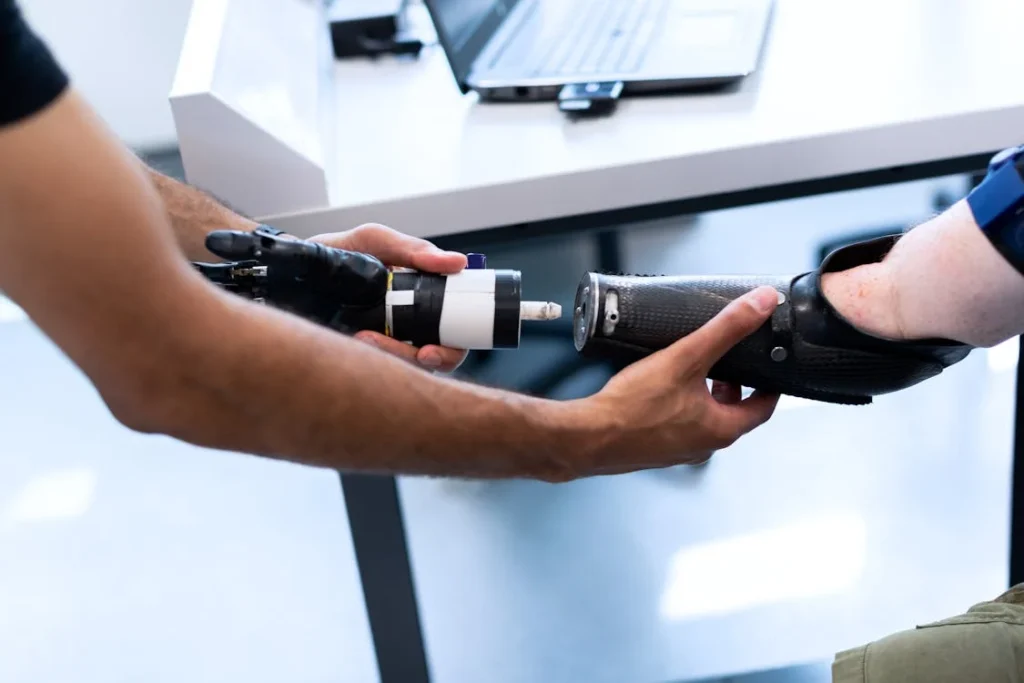
The Role of Rehabilitation in Emotional and Physical Recovery
Recovering from an amputation is not just about learning to use a prosthetic—it’s about rebuilding your strength, confidence, and independence. Rehabilitation plays a major role in this process.
The right approach can help you regain movement, adapt to new challenges, and, most importantly, restore your sense of control over your life.
How Physical Therapy Helps with Mental Health
Physical recovery and emotional well-being are deeply connected. When your body moves and strengthens, your mind benefits too. Exercise releases endorphins, the brain’s natural way of reducing stress and boosting mood.
This is why physical therapy isn’t just about movement—it’s also a powerful tool for fighting anxiety and depression.
Working with a skilled therapist helps you set small, achievable goals. These victories, no matter how small, build confidence and prove that you are making progress.
Learning how to walk with a prosthetic or regain hand function can be challenging at first, but with patience and practice, these skills become second nature.
At Robobionics, we encourage a structured rehabilitation process that includes gamified therapy. Our home-based rehabilitation programs make learning fun, engaging, and interactive, helping you adjust to prosthetic use in a stress-free way.
If you’re looking for an effective way to improve your prosthetic experience, contact us to learn more about our rehabilitation solutions.
The Importance of Staying Active
One of the biggest challenges after an amputation is avoiding a sedentary lifestyle. When movement feels difficult, it’s tempting to stay in bed or on the couch, but this can worsen both physical and mental health.
Lack of movement can lead to muscle stiffness, increased fatigue, and deeper feelings of sadness or frustration.
Even small amounts of activity can make a difference. Whether it’s stretching, short walks, or simple exercises, keeping your body active helps maintain energy levels and improves overall mood.
Adaptive sports, swimming, or even yoga can provide excellent ways to stay active while also boosting confidence.
Building a New Routine
Adjusting to life with a prosthetic takes time, and having a daily routine can make the transition easier. A structured day helps reduce stress, keeps you focused, and gives you a sense of purpose. Over time, the activities that once felt challenging will become part of your new normal.
Setting aside time each day for rehabilitation exercises, social activities, and self-care can improve overall well-being. The more consistent you are with your routine, the faster your mind and body will adjust.
If you’re struggling to stay motivated, setting small milestones can help. Each time you master a new movement or complete a task more easily, you are proving to yourself that progress is happening. It’s important to celebrate these moments, no matter how small they seem.

The Power of Community and Emotional Support
Healing from an amputation is not just a personal journey—it’s one that is made easier with the right people by your side. No one should have to go through this experience alone.
Finding support from loved ones, professionals, and other amputees can provide comfort, guidance, and encouragement when you need it most.
Connecting with Family and Friends
Your family and friends may not fully understand what you’re going through, but their support can still be a powerful source of strength. It’s important to communicate openly with them about your feelings and needs.
Let them know when you need encouragement, but also when you need space.
At the same time, be patient with them. Just as you are adjusting to life after amputation, they are also learning how to support you. Some people may not know what to say or do, and that’s okay.
Helping them understand your journey can strengthen your relationships and create a more supportive environment.
Engaging in activities with loved ones can also help bring back a sense of normalcy. Whether it’s having a meal together, watching a movie, or going for a short walk, staying connected with others can help fight feelings of isolation.
Finding Strength in Support Groups
One of the best ways to cope with the emotional challenges of amputation is to connect with others who have been through the same experience.
Support groups, both in-person and online, offer a space to share struggles, celebrate victories, and learn from others who truly understand.
Speaking with fellow amputees can provide reassurance that you are not alone. Hearing their stories of resilience and adaptation can inspire hope and give you practical advice on overcoming obstacles.
These groups can also help reduce feelings of self-doubt, showing you that life after amputation is not just about survival—it’s about thriving.
Many organizations and online communities offer mentorship programs where new amputees can receive guidance from those who have been living with a prosthetic for years.
Learning from someone who has already navigated the challenges you’re facing can be incredibly empowering.
At Robobionics, we are committed to fostering a supportive community for prosthetic users. We believe that sharing experiences and learning from others can make the transition smoother and less overwhelming.
If you’re looking for a place to connect with other amputees and receive expert advice, reach out to us today.
Seeking Professional Help When Needed
Sometimes, emotional struggles can become too heavy to carry alone. If anxiety or depression is interfering with daily life, seeking help from a mental health professional can be life-changing.
Therapy provides a safe space to express feelings, develop coping strategies, and gain new perspectives.
There are therapists who specialize in working with amputees, trauma recovery, and disability-related challenges. Speaking with someone who understands the emotional impact of limb loss can provide relief and actionable steps toward healing.
Medication can also be an option for those experiencing severe depression or anxiety. A healthcare provider can help determine if this is the right path for you. There is no shame in seeking help—it is a sign of strength, not weakness.
conclusion
Adjusting to life after an amputation is not easy, but it is possible. The emotional challenges of anxiety and depression may feel overwhelming at times, but they do not define you. With patience, support, and the right mindset, you can rebuild your confidence, find new purpose, and regain independence.
Healing is a journey, and every small step forward is a victory. Surround yourself with supportive people, seek professional help when needed, and remind yourself that progress takes time. You are stronger than your struggles, and your life is still full of possibilities.
At Robobionics, we are committed to helping amputees not just regain function, but also rebuild confidence and joy. Our prosthetic solutions, rehabilitation support, and community connections are designed to make your journey smoother. If you’re ready to take the next step, contact us today and let’s move forward together.
You are not alone, and your story is far from over. A new chapter is waiting—one filled with strength, resilience, and hope.



